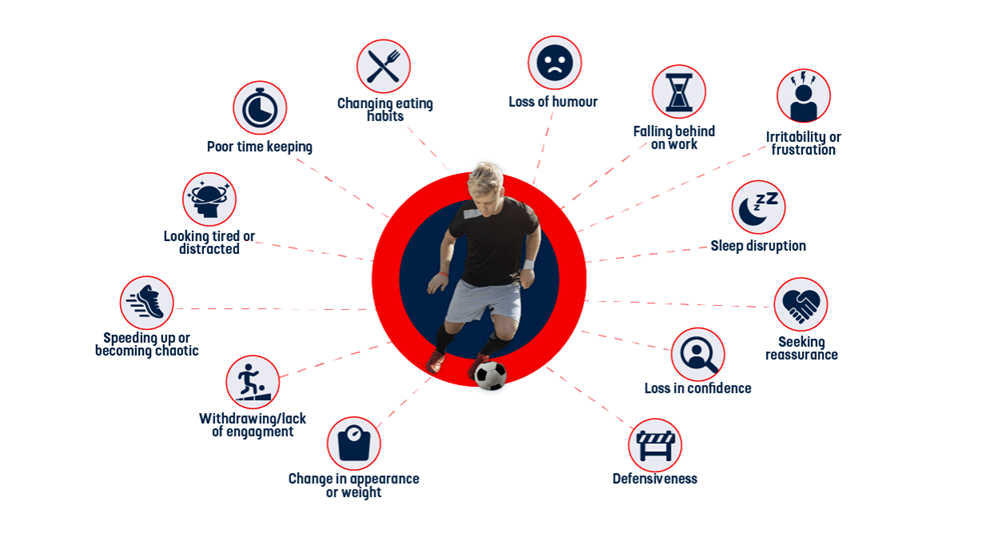Welfare Hub
Taking care of yourself and those in your team
We all have mental health just like we all have physical health, every day, all of the time. Mental health includes how we think and feel about ourselves. It is not a static state, it is always fluctuating, and we will all have times in our lives where we feel our mental health is poor and we are unsettled or struggling, and other times when we are excelling and our mental health is really good.
Not only does it keep us in good physical shape, but football can also be a powerful tool in helping to manage our mental health. On this page you will find a whole range of resources to use if you or someone within your club needs some support.
Get Involved!
There is clear evidence that regular exercise promotes good mental health. It can help to reduce the level of stress hormones in your body and stimulate the production of mood-enhancing hormones. Not only that, but the social side of football will get you out in the fresh air, forming friendships and helping to combat loneliness.
Getting involved with football is therefore a fantastic way of improving your mental health, no matter whether you are a player, coach or volunteer.
You can find opportunities in your area using our Find Football tool, or use our Player Recruitment Hub to see clubs that are actively searching for players.

Mind
Can you spot the signs of a player who might be struggling?
Player Welfare in Open Age Football

England Football Welfare
Drugs:
- The FA’s Anti-Doping guidance
- Frank – information about drugs
- NHS
Rehab support:
Gambling:
- The FA’s betting, match-fixing and inside information guidance
- Gamble Aware
- 24/7 National Gambling Helpline - 0808 8020 133
- ARA - support for gambling problems
Debt Advice:
- Contact The Alzheimer’s Society for further information and resources
- Read more about the links between head injury and brain disease.
- Find out more about bereavement
- Cruse is an organisation offering specialist grief and bereavement support (in all contexts, not just catastrophic incidents).
The helpline number is 0808 808 1677.
Organisations:
- National Domestic Abuse Help Line (Refuge) 0808 2000 247
- The Respect phoneline is an anonymous and confidential helpline for men and women who are abusing their partners and families: 0808 802 4040
- The Men’s Advice Line, for male domestic abuse survivors: 0808 801 0327 (run by Respect)
- National LGBT+ Domestic Abuse Helpline: 0800 999 5428 (run by Galop)
- Women’s Aid.
- Ann Craft Trust blog: How Can Sport Organisations Support People Experiencing Domestic Abuse.
If you are concerned that any players you support are vulnerable to radicalisation you can access training and you can speak with your County FA DSO about ways to minimise the risks associated with extremism.
For further learning the following resources may be useful:
- The free 1-hour Stand Up Against Harassment Training provided by the Suzy Lamplugh Trust helps to challenge some of the common reasons for bystanding and offers ideas for safely intervening
- UN Women – Safe Spaces Now
Safeguarding concerns
Gloucestershire FA is committed to its responsibilities to safeguarding the welfare of all young people involved in grassroots football. We fully support and appreciate our team of dedicated volunteer Club and League Welfare Officers working towards maintaining a safe and fun environment for young people who play, train, referee and coach.
Click here to visit our main safeguarding page for more guidance.
If you have any concerns about a child or young persons welfare report it to your Club Welfare Officer or our Designated Safeguarding Officer using the details to the right.
Furthermore, you can contact The FA/ NSPCC's or The FA Safeguarding team, with the contact details in the box above.
Please remember that if a child or young person is in immediate danger, ALWAYS call 999.
Get In Touch
Gemma Szakacs
GFA Designated Safeguarding Officer
Email: Safeguarding@GloucestershireFA.com
Emergency Out of Hours: 07960 500 130
FA / NSPCC 24 hour Hotline number:
0808 800 5000
The FA Safeguarding Team E-mail:
Safeguarding.Children@thefa.com



